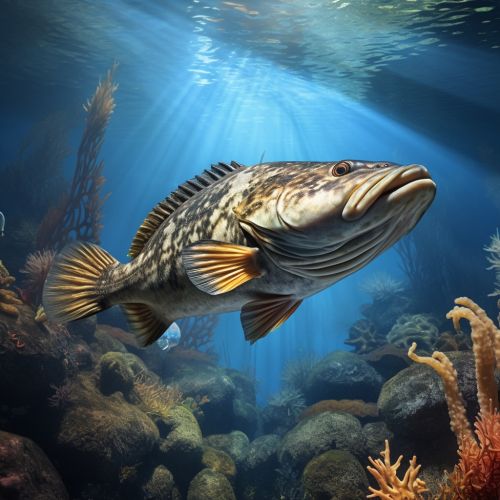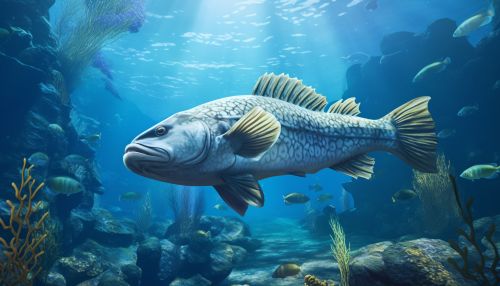Cod
Taxonomy and Species
The Atlantic cod (Gadus morhua) is a benthopelagic fish of the family Gadidae, widely consumed by humans. It is also commercially known as cod or codling. Dry cod may be prepared as unsalted stockfish, as cured salt cod or clipfish. In the western Atlantic Ocean, cod has a distribution north of Cape Hatteras, North Carolina, and around both coasts of Greenland and the Labrador Sea; in the eastern Atlantic, it is found from the Bay of Biscay north to the Arctic Ocean, including the Baltic Sea, the North Sea, Sea of the Hebrides, areas around Iceland and the Barents Sea.


Biology and Life Cycle
The Atlantic cod is a well-studied example of a keystone species, which has an important role in the ecosystem. The life cycle of the Atlantic cod consists of several stages. The eggs and larvae of the cod are pelagic, while the adults are benthic organisms. The cod's spawning season takes place between January and April, with a peak in March and April. The cod larvae and pelagic eggs drift with the ocean currents and grow into adulthood. The adult cod then return to coastal areas to spawn. The Atlantic cod can live for 25 years, and older females produce the most eggs. The Atlantic cod's diet includes smaller fish such as haddock and whiting, shellfish, sea worms, squid, and crustaceans.
Commercial Fishing
Cod has been an important economic commodity in an international market since the Viking period (around 800 AD). Norwegians used dried cod during their travels, and soon a dried cod market developed in southern Europe. This market has lasted for more than 1,000 years, passing through periods of Black Death, wars and other crises and still is an important Norwegian fish trade. The Portuguese since the 15th century have been fishing cod in the North Atlantic, and clipfish is widely eaten and appreciated in Portugal. The Basques also played an important role in the cod trade and are believed to have found the Canadian fishing banks before Columbus' discovery of America. The North American east coast developed in part due to the vast amount of cod, and many cities in the New England area spawned near cod fishing grounds.
Conservation Status
Overfishing has severely reduced the populations of cod. For example, the North Sea cod stocks have collapsed in the years 2000 and 2001, and it is feared the North Sea fishery will soon share the fate of the Grand Banks cod fishery off Newfoundland, which collapsed in 1992 and has failed to recover. In 2010, Greenpeace International added the Atlantic cod to its seafood red list. "The Greenpeace International seafood red list is a list of fish that are commonly sold in supermarkets around the world, and which have a very high risk of being sourced from unsustainable fisheries."
